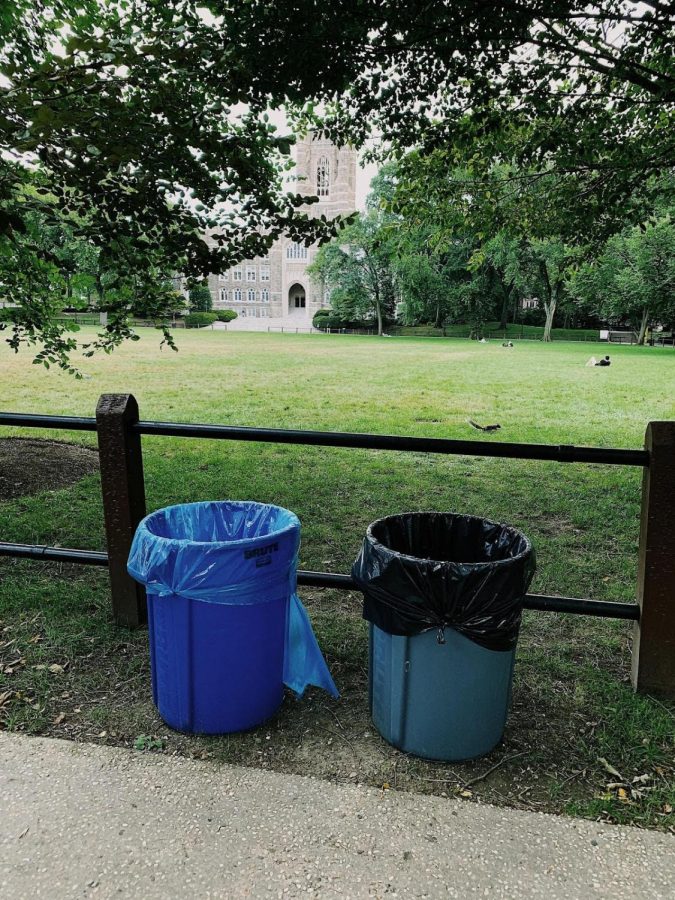How Fordham Can Maintain Environmental Stability During a Damaging Pandemic
For the past few years, Fordham University has taken significant steps towards making its campuses much more environmentally friendly, aiming to “design, construct and maintain our buildings, infrastructure and grounds in a manner that ensures environmental sustainability,” according to Fordham’s website. Fordham has installed purified water stations, placed recycling bins all across campus and pledged that all new structures will be deemed “green” over the next decade. The university also works closely with the New York Botanical Garden and Bronx Zoo to ensure the aforementioned “environmental sustainability.”
Unfortunately, Fordham’s dedication to maintaining campus environmentalism has wavered due to the ongoing coronavirus pandemic. The suspension of indoor dining and implementation of grab-and-go has led to a steady increase of single-use, disposable product usage. Fordham enforced these guidelines to prevent the dispersion of germs yet has offered few solutions to reduce the ever-growing waste production on campus.
For instance, when eating at the cafeteria, students receive a paper to-go box for their meals upon swiping in. However, the workers must serve the food on additional plastic plates, which students use to dump their food into the to-go boxes. By the end of the day, the cafeteria’s trash cans are overflowing with unused plates. Fordham established these guidelines to protect both the cafeteria’s staff and students from coronavirus transmission, yet the usage of these plates only produces an unnecessary accumulation of trash on campus.
The sudden influx of students spending time outdoors has also led to a rise in littering and trash build-up. A majority of students take their to-go meals and eat outside on Edward’s Parade or designated outdoor dining areas. Eating outdoors does serve as a great alternative, but it raises some concerns about littering. Soda cans and paper wrappers string across Eddie’s, and the surrounding trash cans are often filled to the brim by the afternoon. Unfortunately, the same cannot be said about recycling bins — they look virtually empty compared to the heaps of trash in the garbage pails. Fordham does have posters promoting recycling across campus, but many disposable items such as the paper trays from Urban or the cafeteria’s to-go boxes are not salvageable after use.
There’s no easy way to fully fix the issue surrounding single-use items because of the coronavirus. However, students can enact their own measures to help reduce their carbon footprint on Fordham’s campus. The Five Rs we learned in elementary school — refuse, reduce, reuse, repurpose and recycle — are more important than ever.
Replacing the use of disposable products starts with incorporating reusable products into daily routines. These items, from washable containers, reusable water bottles and Tupperware, are available in multiple off-campus locations such as TJ Maxx and Walgreens. Amazon, too, offers multiple sustainable options.
For meals, bringing Tupperware to the cafeteria can reduce the number of disposable boxes from being used. While forks, spoons and knives may be more difficult to find, students can always re-wash disposable versions in their sinks.
Students often recommend purchasing reusable water bottles to replace the plastic alternatives at coffee shops, such as Fordham’s on-campus Starbucks. Starbucks typically advocates for students to bring their reusable cups into their locations to reduce plastic use, but COVID-19 guidelines restrict the usage of these cups to prevent the spread of germs. Therefore, students can only purchase their Starbucks drinks in plastic, single-use cups for the time being. However, an alternative to reusable coffee cups is the classic mason jar (with a reusable straw, of course). They are affordable, recyclable and aesthetically pleasing.
There are also options available that don’t relate to food. Students can bring reusable bags to Rams, Best or TJ Maxx instead of bringing home multiple plastic bags after every shopping spree. Additionally, cloth masks limit the number of disposable ones found across campus grounds. Fordham provided all incoming students with masks of their own, and local businesses also sell them. These reusable masks can make quite the fashion statement, too!
If students still find disposable products much more convenient and cost-effective than reusable ones, they can still help the environment by purchasing biodegradable versions. Whole Foods possesses a wide selection of biodegradable, disposable plates, bowls and even cutlery that students can order online.
Recycling is an easy way to cut back on your carbon footprint. Fordham added multiple recycling bins all across campus. The dorms also have recycling bins inside the trash rooms for paper and plastic products. Throwing a plastic fork or a paper plate into the recycling bin instead of the trash can makes a world of difference. That product can now be incorporated into something else rather than pile up in a landfill.
Sustainability at Fordham doesn’t just include using reusable products; saving energy is also important for maintaining a green campus. Students spend most of their days in their rooms in online Zoom lectures. This means that students spend more time in their dorms, leading to higher usage of power.
Reducing power usage comes in many forms, but the easiest way to do so is to turn things off when they’re not being used. Unplugging wires, turning off lights and shutting down air conditioning units are a few key actions students can do. Students can turn to nature instead. Opening a window replaces air conditioning on a cooler day, and sunlight can illuminate an entire room for a long day of classes.
One last thing to do includes getting involved with Fordham’s various sustainability programs located on campus. The environmental studies department sponsors an Environmental Club at both the Rose Hill and Lincoln Center campuses where students can pursue ecology projects and promote sustainable programs at Fordham.
If the Fordham student bodies all reduce waste and continue embracing the outdoors, we can definitely pursue a greener future on all of our campuses.









































































































































































































